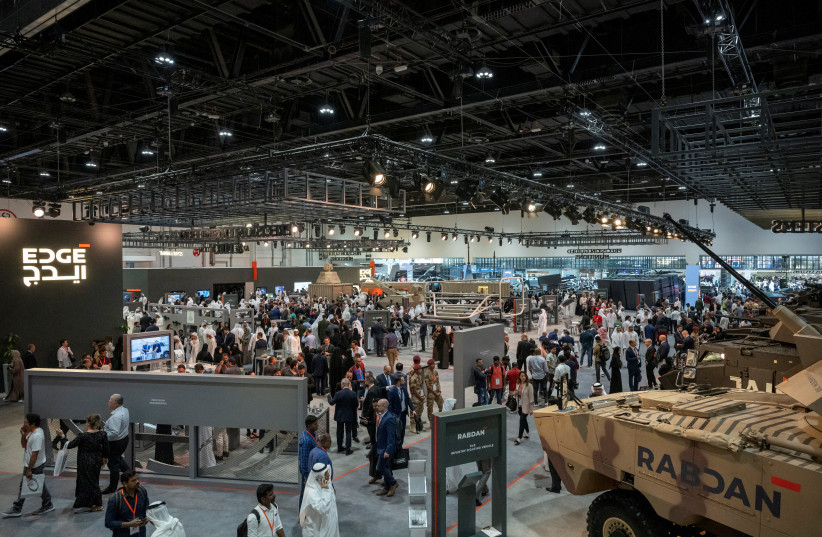An inaugural I2U2 Business Forum convened to “accelerate joint investment in key sectors” in the UAE this week, bringing together Israel, India, the UAE and the US, an essential and important partnership that came about in the wake of the Abraham Accords.
In terms of shared interests, these countries are key to regional stability; the way they can work together is enhanced by business ties. The meeting came amid the IDEX and NAVDEX defense exhibitions in the UAE, where leading defense companies, including many Israeli ones, are currently exhibiting.
Israel and India are already strategic partners and allies. Israel and the UAE form a key part of the Abraham Accords, and there is a lot of synergy between the two countries because of Israel’s leading place in the hi-tech sector and the UAE’s centrality in global trade and innovation.
Unique partnership
When India, an economic behemoth, and the US, the global leader, are added to this, the partnership is unique due to how it spans the oceans and holds implications for stretching relations across the Indian Ocean, Gulf of Oman and then to the East Med and Atlantic.
The UAE’s Ministry of Foreign Affairs noted that the I2U2 Business Forum began with opening remarks by His Excellency Ahmed Al Sayegh, UAE minister of state; Jose W. Fernandez, US under secretary of state; Shri Dammu Ravi, secretary (economic relations) at the Indian Ministry of External Affairs; Ronen Levi, director-general at Israel’s Foreign Ministry, and Brett McGurk, deputy assistant to the US President and White House coordinator for the Middle East and North Africa.”

Fernandez thanked Al Sayegh and “distinguished counterparts from India, Secretary Ravi, and from Israel, political director [Aliza] Bin-Noun.” Fernandez is the undersecretary for economic growth, energy and environment. He noted that the grouping was announced in October 2021, in an effort led by US Secretary of State Antony Blinken.
“Our countries are committed to the shared goals of prosperity, peace and innovation, and we are focused on advancing mutually beneficial economic priorities – a partnership based in cooperation, not competition. This initiative spans regions and sets a precedent for what is possible,” said Fernandez.
“I2U2 provides a new regional platform to deepen economic integration, and an affirmative agenda within the Middle East, Asia and beyond. It serves as a model for promoting trusted regional partnerships that can create collaborative commercial opportunities and good paying jobs,” he continued.
Fernandez mentioned broadening work to other sectors, including technology and semiconductors.
What's in the future?
“We are excited about the future of I2U2, including our pipeline of projects in solar, wind, rail transport infrastructure – multibillion-dollar initiatives that will take time and expertise. My team is working closely with our I2U2 counterparts to explore additional projects to tackle food insecurity and advance space cooperation – areas that will require us all to share expertise, adapt to climate challenges, and invest in innovative technology.” Food security, always an issue, has been even more pertinent recently due to the war in Ukraine.
The UAE noted that “companies and private sector representatives then exchanged insights and discussed potential partnerships during seven parallel sessions focused on the food security, energy, water, space, transport, health, and technology fields. The I2U2 Business Forum aims to become a regular platform for private and public entities from India, Israel, the UAE, and the US to convene and establish tangible joint business ventures in I2U2’s core economic and technological fields.”
While there are generalities associated with the announcements, the overall context and implications are clear: I2U2 is a unique partnership that enables Israel and the UAE to link up with the US and India, making the West and Asia partners.
These countries are not always on the same page: The US and the West are engaged in backing Ukraine, while Israel, India and the UAE have been more cautious. On issues such as trade with China, Israel and the UAE have been under the spotlight because of concerns about China’s attempts to influence the Middle East.
While this is now less of an issue with Israel, clearly China still wants to be a key player in the Gulf. Nevertheless, the overall trend is clear. As the US shifts priorities and confronts near-peer adversaries, India, Israel and the UAE remain key US partners and allies. These are countries that have a lot to gain together and are more than the sum of their parts. Defense ties, and issues like green tech are only part of the multiple layers that make the I2US combo so important going forward.
